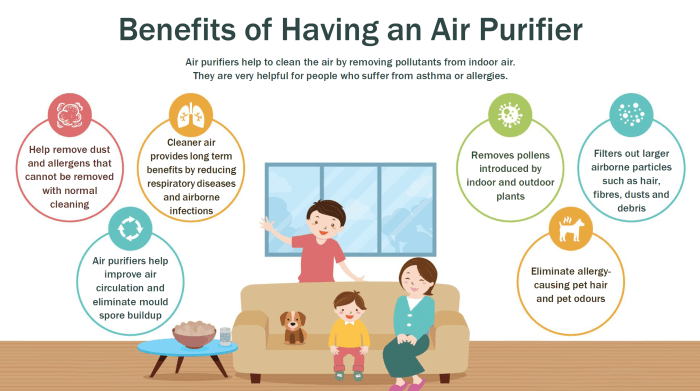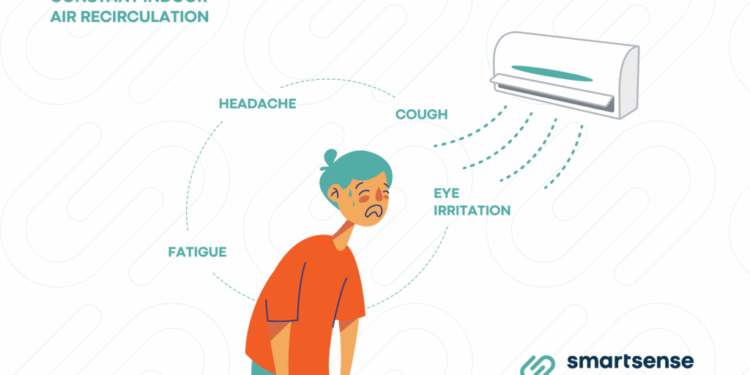
Delving into the realm of Air Conditioning for Allergies: Tips for Cleaner Indoor Air, readers are invited to explore a wealth of knowledge presented in a captivating manner, ensuring an informative and engaging read.
The subsequent paragraph provides a detailed insight into the topic at hand, setting the stage for a comprehensive discussion.
Importance of Clean Indoor Air
Having clean indoor air is essential for managing allergies as it helps reduce exposure to common allergens that can trigger allergic reactions.
Common Allergens Found in Indoor Air
- Dust mites
- Pet dander
- Mold spores
- Pollen
Airborne particles like these can exacerbate allergy symptoms and impact overall respiratory health.
How Air Conditioning Helps Improve Indoor Air Quality
Using air conditioning systems with proper filters can help remove allergens from the air, providing relief for allergy sufferers. The filters trap particles like dust, pet dander, and pollen, preventing them from circulating in the indoor environment.
Choosing the Right Air Conditioning System
When looking to alleviate allergies through your air conditioning system, it's crucial to consider key features that can make a difference in indoor air quality.
Types of Air Filters
Air filters play a vital role in reducing allergens in the air. Here are some common types and their effectiveness:
- HEPA Filters:High-Efficiency Particulate Air filters are known for their ability to trap small particles, including allergens like dust, pollen, and pet dander.
- Activated Carbon Filters:These filters are effective in absorbing odors, gases, and chemicals, but may not be as efficient in capturing allergens.
- UV-C Light Filters:Utilizing ultraviolet light to kill bacteria, viruses, and mold spores, these filters can help improve indoor air quality.
Importance of Proper Maintenance
Regular maintenance of your air conditioning system is crucial for allergy control. Here's why:
- Dirty filters can lead to poor air quality and worsen allergy symptoms.
- Regular cleaning and inspection of ducts can prevent the buildup of allergens like dust and mold.
- Ensuring proper ventilation and humidity control can create an environment less conducive to allergens.
Tips for Cleaner Indoor Air

Indoor air quality plays a crucial role in managing allergies. Besides using air conditioning, there are several strategies you can implement to reduce allergens in your home, set the ideal temperature and humidity levels, and utilize air purifiers effectively.
Reducing Allergens in the Home
- Vacuum and dust regularly to remove dust mites, pet dander, and other allergens.
- Wash bedding, curtains, and other fabrics frequently in hot water to eliminate allergens.
- Keep windows closed during high pollen seasons to prevent outdoor allergens from entering your home.
- Use allergen-proof covers on pillows and mattresses to reduce exposure to dust mites.
Setting Ideal Temperature and Humidity Levels
- Keep indoor humidity levels between 30-50% to prevent mold growth and dust mites.
- Set the thermostat to maintain a comfortable temperature around 70-72 degrees Fahrenheit.
- Consider using a dehumidifier in damp areas of your home to control humidity levels.
Using Air Purifiers
- Choose an air purifier with a HEPA filter to capture airborne allergens effectively.
- Place air purifiers in commonly used areas or bedrooms for maximum impact.
- Run the air purifier continuously, especially if you suffer from allergies or respiratory conditions.
Creating an Allergy-Friendly Home Environment

Creating an environment that minimizes allergens can significantly improve the quality of life for allergy sufferers. By taking simple steps to reduce dust, pet dander, and other triggers, you can create a more comfortable living space.
Minimizing Dust and Pet Dander
- Vacuum and dust regularly to reduce the buildup of dust particles in your home.
- Invest in a high-efficiency particulate air (HEPA) filter for your HVAC system to capture pet dander and other allergens.
- Wash bedding, curtains, and rugs frequently to remove allergens that can accumulate over time.
Benefits of Hypoallergenic Bedding and Furniture
- Opt for hypoallergenic bedding and furniture to minimize the presence of allergens in your home.
- Hypoallergenic materials are designed to resist dust mites, mold, and other common allergens, providing a cleaner and healthier environment.
- Consider using mattress and pillow protectors to create an additional barrier against allergens.
Keeping Indoor Plants for Air Purification
Indoor plants can help improve air quality by filtering out pollutants and releasing oxygen. However, some plants may trigger allergies in sensitive individuals. Opt for plants that are known for their air-purifying properties without causing allergy flare-ups, such as:
- Spider Plant
- Peace Lily
- Boston Fern
Final Wrap-Up
Concluding our exploration, the summary encapsulates the key points discussed, leaving a lasting impression on the importance of cleaner indoor air.
Questions and Answers
How can clean indoor air help manage allergies?
Clean indoor air reduces exposure to allergens, easing symptoms for allergy sufferers.
What features should I look for in an air conditioning system for allergy relief?
Look for systems with high-efficiency particulate air (HEPA) filters and proper ventilation.
How can I reduce allergens in my home besides using air conditioning?
Regularly clean and vacuum, wash bedding in hot water, and keep pets groomed.
What is the ideal temperature and humidity level for allergy sufferers?
Keep humidity levels below 50% and maintain a temperature around 70°F for optimal comfort.
How can air purifiers complement air conditioning in improving indoor air quality?
Air purifiers can capture additional airborne particles that may escape filtration by the air conditioning system.
Why is it important to use hypoallergenic bedding and furniture?
Hypoallergenic materials can reduce exposure to allergens and create a safer environment for allergy sufferers.
Which indoor plants can help purify the air without triggering allergies?
Plants like spider plants, aloe vera, and peace lilies are known for their air-purifying qualities and are less likely to cause allergies.













